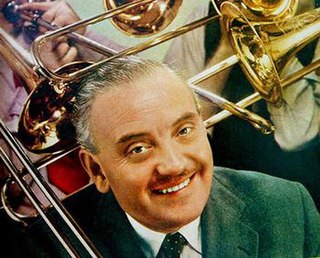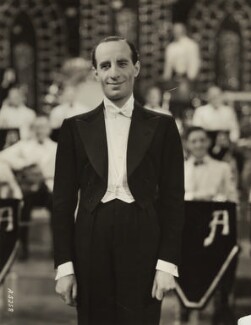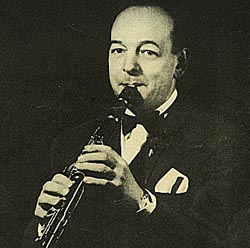
The flugelhorn, also spelled fluegelhorn, flugel horn, or flügelhorn, is a brass instrument that resembles the trumpet and cornet but has a wider, more conical bore. Like trumpets and cornets, most flugelhorns are pitched in B♭, though some are in C. It is a type of valved bugle, developed in Germany in the early 19th century from a traditional English valveless bugle. The first version of a valved bugle was sold by Heinrich Stölzel in Berlin in 1828. The valved bugle provided Adolphe Sax with the inspiration for his B♭ soprano (contralto) saxhorns, on which the modern-day flugelhorn is modelled.

George Edward Heath was a British musician and big band leader.

Benjamin Baruch Ambrose, known professionally as Ambrose, was an English bandleader and violinist. Ambrose became the leader of a highly acclaimed British dance band, Ambrose & His Orchestra, in the 1930s.
George Chisholm OBE was a Scottish jazz trombonist and vocalist.
The Squadronaires is a Royal Air Force band which began and performed in Britain during and after World War II. The official title of the band was 'The Royal Air Force Dance Orchestra', but it was always known by the more popular title "The Squadronaires".
Louis Stone known professionally as Lew Stone was a British bandleader and arranger of the British dance band era, and was well known in Britain during the 1930s. He was known as a skillful, innovative and imaginative musical arranger.
Philip William Seamen was an English jazz drummer.

British dance band is a genre of popular jazz and dance music that developed in British dance halls and hotel ballrooms during the 1920s and 1930s, often called a Golden Age of British music, prior to the Second World War.
Brian Lemon was a British jazz pianist and arranger.

Kenny Baker was an English jazz trumpet, cornet and flugelhorn player, and a composer.
Keith Ronald Christie was an English jazz trombonist. He was the brother of Ian Christie.
Kenneth John Moule was an English jazz pianist, best known as a composer and arranger.

Isador Simon "Sid" Phillips was a British jazz clarinettist, bandleader and arranger.
Thomas Mitchell Watt was a Scottish jazz bandleader.
Ian Wilfred Hamer was a British jazz trumpeter.
George Evans was an English jazz bandleader, arranger, tenor saxophonist and vocalist.
Derek Roy Watkins was an English jazz, pop, and classical trumpeter. Best known for his lead trumpet work on the soundtracks of James Bond films, Watkins recorded with British jazz bandleaders as well as the Royal Philharmonic Orchestra, the London Symphony Orchestra, and The Beatles. Dizzy Gillespie called him "Mr. Lead".
Robert Dodsworth, better known as Bobby Worth, is a British jazz drummer. He was named the 1998 British Telecom Drummer of the Year.
This is a timeline documenting events of Jazz in the year 1914.
Gregory Bowen is a Welsh trumpet player. His primary work was done in London before relocating to Berlin, Germany in 1976. Since 1961, Bowen has performed and recorded with jazz, pop artists and entertainers from Europe and North America on records, soundtracks and T.V. broadcasts. Most notable is his lead trumpet work on the James Bond film soundtracks Goldfinger, Thunderball and You Only Live Twice.






